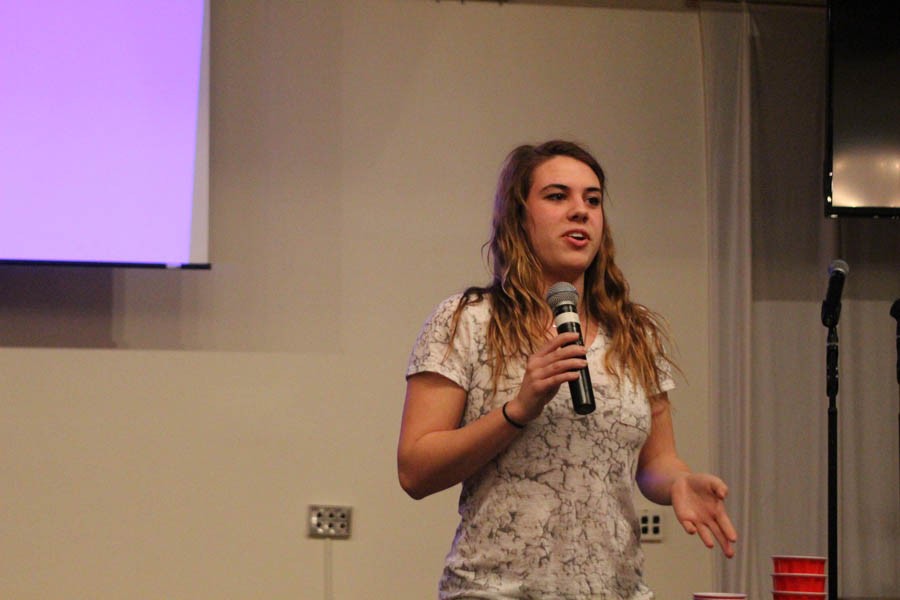Senior speaks out about experience with anorexia
Senior Charlotte Molali speaks out to her peers at senior retreat about her battle with anorexia. Recently, Molali has been sharing her story with others, including students at Towson University.
April 1, 2015
Groggily sitting up in bed, Charlotte Molali awakens suddenly when she realizes her parents were hovering over her. The packed bag in the corner and the mid-morning sun streaming through the window on what should have been a school day indicated that something was different about that Tuesday morning.
“My room was empty [and they] told me they were taking me to the hospital,” Molali said. The next thing she knew, she was on the way to Sheppard Pratt.
Since her freshman year at Notre Dame Prep, current senior Molali had struggled with anorexia, but it was not until Dec. 11 of her sophomore year at JC that she and her family took steps.
“I didn’t really know I had a problem, but I lost a bunch of weight my freshman year and became very depressed. My parents said I could transfer schools, but we soon realized that transferring wasn’t going to solve the problem,” Molali said.
Upon her arrival at Sheppard Pratt, Molali was forced to eat a snack before dinner, having not eaten anything that day. Molali found it difficult to eat the pretzels, apple sauce, and juice she was given.
After that, Molali was admitted to the hospital as an inpatient at the highest level of care. Each morning, she had to have her vitals checked and be weighed, take a brief shower, and sit for an hour before breakfast.
“[The program] is specifically made so you gain weight,” Molali said. According to her, this goal was

Senior Charlotte Molali’s abstract self-portrait contains elements that reflect her experience with anorexia. After spending over a month at Sheppard Pratt during her sophomore year, Molali started her recovery.
achieved through large meals and strictly enforced periods of sitting.
Exercise was not an option, which was a major transition for Molali, who had been doing 2,000 jumping jacks daily, plus other cardio exercises.
In addition to her daily exercises, Molali previously competed in Irish dancing and had qualified for Worlds before her admittance to the hospital. “[Dance] was my whole life,” Molali said.
Adjusting to the size of the meals — three per day plus a snack — was difficult for Molali who had to learn to finish everything on her plate, down to the last bit of mayonnaise in the packet.
While eating, showering, and using the bathroom, Molali was monitored by nurses who would also supervise all activities. According to her, the day was rigidly structured with group sessions and activities. “You feel like you’re five years old again,” Molali said.
Although the hospital restricted Molali in many capacities, she was able to meet people from all over the world. “I met people from Greece and England and even bonded with my five other roommates when we would gossip about the staff,” Molali said.
Molali remains in contact with some of the people she met while at the hospital, though she says that can be both a source of both negativity and positivity and that she has to be discerning.
“I tried really, really hard [to get better],” Molali said. “I wanted to get better, and I wanted to get out.”
After she was released from the hospital in January, Molali was restricted from exercise for six months and was forced to give up dance. However, she was determined to go back to high school.
“A lot of the girls that I was with [in the hospital] didn’t go back to high school,” Molali said. “I wanted it to be normal. I still wanted to be able to go to high school.”
Despite her motivation, the transition back to high school was still an adjustment. “I ended up failing geometry, but focused much of my time on my sophomore research paper,” she said.
Since her stay at Sheppard Pratt during her sophomore year, Molali has been vocal about her experiences and spreading eating disorder awareness.
“Sharing your story can help others know they’re not alone,” Guidance Counselor Carol Heflin-Shupe said.
Molali shared some of her story with seniors during Senior Retreat on March 13.
“A lot of people ask why I’m so vocal about it,” Molali said. “I know that if I didn’t speak out, [certainly] other people wouldn’t be getting help. It keeps me [focused].”
According to her, eating disorders are “secretive,” and one of the best ways to help someone is to put them in contact with someone who can help, like a guidance counselor, and to just be there for them. Also, she encourages people to talk to the person’s parents and let them know what is going on.
Heflin-Schupe adds that students should use the Yellow Ribbon cards they were given at an assembly on March 19. “[Give them] to any adult and say, ‘I’m asking for help.’ Those adults will get them to the nurse, the counselors, or whomever [can help],” Heflin said.
Molali continues to attend support group meetings and plans to take her treatment plan with her to college. “I know I wouldn’t be where I am today if I did not receive treatment.”
Hanna LeBuhn is the Print Chief and Kathy Deaver is the Online Chief for The Patriot and jcpatriot.com.



